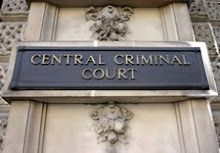From The Times
March 24, 2006
Armed guards and a hint of Kevlar at the Old Bailey
By Giles Whittell
A PROMISE is a promise, and the promise made to Muhammad Babar by the two main allies in the war on terrorism is that they will keep him safe. Yesterday, the first job at the Old Bailey was security. Quite how the security got there was never clear, but at 3:29pm, it did. That was when the first two Heckler & Koch MP5 submachine guns materialised on the public landing outside Court 8, pointed coyly at the parquet by their mute handlers.
We were assured there were MP5s at every entrance to Sir Michael Astill’s courtroom. He let us in, spoke kindly to the jury, let us out, and there were the guns again, only this time with different handlers. The people looking after Babar for Washington’s witness protection programme — to which the witness, on loan to the Crown Prosecution Service from a top-security Manhattan jail, has entrusted his faith — keeps its operatives on their toes. They kept us on ours.
Would Babar wear body armour in the box? For a moment it looked as if he had, but what appeared at first to be the discreet outline of a Kevlar undergarment was more likely a bulky torso in an ironed shirt, collar askew under a grey pullover. David Waters, QC, for the prosecution, asked Babar to look straight ahead towards the jury and the judge. The witness seemed relieved.
To his left, behind thick glass, sat the seven men whom he has agreed to give evidence against. Behind them sat 11 more police officers, unarmed and almost cuddly in the circumstances. Between the accused and their accuser: a small ocean of wigs and laptops.
Mr Waters repeatedly asked Babar to slow down for the court reporter, and little wonder. The journey that brought him from Peshawar to the Central Criminal Court via New York, Colindale and Afghanistan, has been long and torturous. He has much to say. Yesterday we heard that the first geopolitical spasm to “excite” him was the Gulf War; that in the ensuing years he learnt to call jihad “the J”; that his mother was in the World Trade Centre on September 11 and survived; and that that calamity was what impelled him to turn a decade of thinking about “the J” into actions he appears to have regretted.
He spoke for all of half an hour, hunched over the microphone, in soft mid-Atlantic tones. He is expected to keep this up for at least a month. No wonder they call him the supergrass.
He left as he had arrived, in an armoured convoy tracked from the sky by a police helicopter. The MP5s had gone, but they will be back.
We were assured there were MP5s at every entrance to Sir Michael Astill’s courtroom. He let us in, spoke kindly to the jury, let us out, and there were the guns again, only this time with different handlers. The people looking after Babar for Washington’s witness protection programme — to which the witness, on loan to the Crown Prosecution Service from a top-security Manhattan jail, has entrusted his faith — keeps its operatives on their toes. They kept us on ours.
Would Babar wear body armour in the box? For a moment it looked as if he had, but what appeared at first to be the discreet outline of a Kevlar undergarment was more likely a bulky torso in an ironed shirt, collar askew under a grey pullover. David Waters, QC, for the prosecution, asked Babar to look straight ahead towards the jury and the judge. The witness seemed relieved.
To his left, behind thick glass, sat the seven men whom he has agreed to give evidence against. Behind them sat 11 more police officers, unarmed and almost cuddly in the circumstances. Between the accused and their accuser: a small ocean of wigs and laptops.
Mr Waters repeatedly asked Babar to slow down for the court reporter, and little wonder. The journey that brought him from Peshawar to the Central Criminal Court via New York, Colindale and Afghanistan, has been long and torturous. He has much to say. Yesterday we heard that the first geopolitical spasm to “excite” him was the Gulf War; that in the ensuing years he learnt to call jihad “the J”; that his mother was in the World Trade Centre on September 11 and survived; and that that calamity was what impelled him to turn a decade of thinking about “the J” into actions he appears to have regretted.
He spoke for all of half an hour, hunched over the microphone, in soft mid-Atlantic tones. He is expected to keep this up for at least a month. No wonder they call him the supergrass.
He left as he had arrived, in an armoured convoy tracked from the sky by a police helicopter. The MP5s had gone, but they will be back.

No comments:
Post a Comment